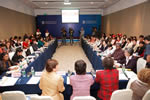Gender and Governance
To improve gender equality in governance, UN-HABITAT has focused on training and capacity building, awards and competitions, research and monitoring, and supporting women’s networks in local governance.  | ©Nanjing Women's Federation Participants at the Women Roundtable at the fourth World Urban Forum in Nanjing. |
a) Training and Capacity Building on Gender Mainstreaming
UN-HABITAT’s training and capacity building for local governments contributes to an improved understanding of gender and the role of local governments, focusing on resource allocation, governance structures, delivery of basic services and infrastructure. Activities have included: - Publication of two major works aimed at local authorities as resources for gender mainstreaming: Gender Mainstreaming in Local Authorities: Best Practices and Gender in Local Government: A sourcebook for trainers
- Partnering with Gender Links to deliver capacity-building workshops for trainers of local governments to incorporate gender mainstreaming (Johannesburg, February 2009).
- A global training of trainers’ workshop is planned for September 2009 in Haifa, Israel. Trainers from local government training institutes are the primary target group.
- Training for local governments and grassroots women on how to improve safety and security for women and girls in cities.Read more about Gender and Safety and Security.
- Training on gender mainstreaming in local governance at the fourth World Urban Forum in 2008, organized in partnership with the Metropolis International Institute.
- Local-to-local dialogues to build skills for grassroots women leaders.
b) Awards and Competitions
UN-HABITAT presented awards for women-friendly cities and gender-responsive local governments in the regions of Asia Pacific and Latin America.
 | ©Women’s Bank
Women’s Bank in Sri Lanka won Gender and Rights-Responsive Sustainable Cities Awards |
The Awards gave recognition to individuals, community groups and women’s organisations on best practices among local authorities in areas such as improving safety and security for women and girls in cities, and gender-responsive programmes that promote disaster resilience.c) Research and Monitoring on Gender Equality in Governance
Monitoring and research helps to establish what strategies governments are using to promote gender equality, providing a basis to assess what works and what doesn’t. Research also helps to identify the gaps in policies, programmes or services that result in unequal treatment or opportunities for men and women.
UN-HABITAT is working with UN-INSTRAW to undertake a detailed analysis of policies, legislation, and programmes on women’s empowerment and gender mainstreaming in local governments in 25 countries around the world.
Research and monitoring of local governments is also part of the Global Programme on Safe Cities Free of Violence Against Women and Girls, a new multi-agency project. UN-HABITAT is a key partner in the Global Programme, led by UNIFEM.
More on UN-HABITAT’s collaboration with UNIFEM d) Supporting women’s networks in local governance
Women are underrepresented in leadership roles, and yet they have the potential to offer a wide range of skills, knowledge and experience to help local governments make improvements for local communities.
As of March 2009, women made up only about 18 per cent of parliamentarians and 20 per cent of local councilors worldwide. While some countries have introduced laws to increase the number of women in politics, there are also additional ways local women can influence their local governments.
 | ©Huairou Commission
A local-to-local training session in Ghana, |
In 2007, UN-HABITAT supported Groots Kenya and the Huairou Commission in the introduction of a “local-to-local” dialogue methodology for leaders of grassroots women’s organizations. The local-to-local methodology enables grassroots women to have constructive discussions with critical actors like municipalities, local authorities, government departments, the private sector and development partners in an effort to address community problems and mobilize resources.
A first regional training took place in March 2009 in Accra, Ghana for grassroots women leaders in West, East and Southern Africa. A further training session took place in Ecuador in July 2009 for Latin America and the Caribbean.
|